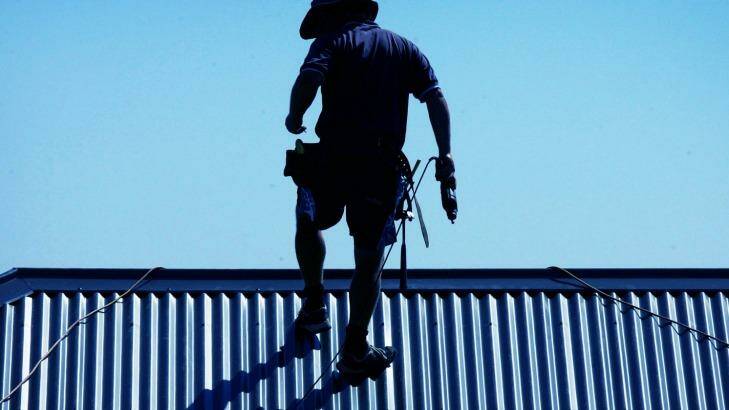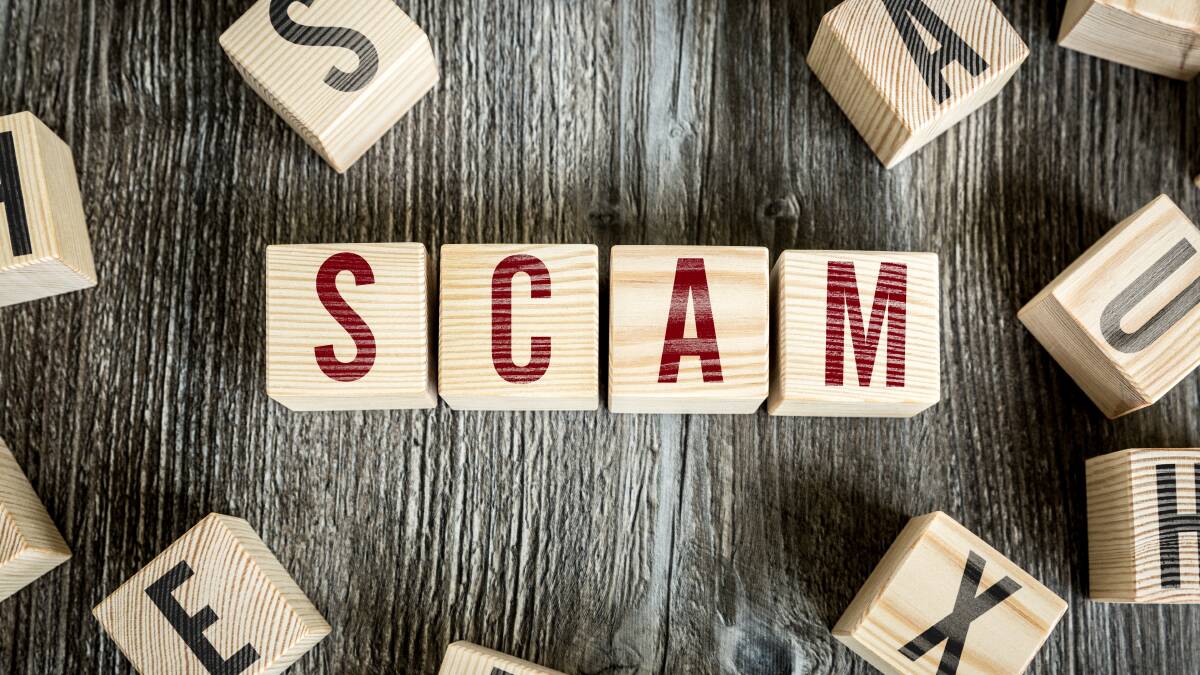Every year, thousands of Australians are targeted by scams, whether it be online, via phone, mail or even in person.
Subscribe now for unlimited access.
$0/
(min cost $0)
or signup to continue reading
The Port Stephens Examiner has compiled a list of current scams identified on sites such as scamwatch.gov.au, the Australian Competition and Consumer Commission's website dedicated to informing people about fraudulent and dishonest activities:
Betting and sports investment scams
Betting and sports investment scams are often a form of gambling disguised as legitimate investments. Most of the schemes or programs do not work as promised and buyers cannot get their money back. In many cases the supplier simply disappears.

Computer prediction software
- Scammer will try to sell you a software program that promises to accurately predict sporting results, usually of team sports or horse racing and promise high returns or profits as a result of the program's use.
- Team sports betting programs claim to identify opportunities based on historical trends and the different odds offered by various bookmakers. Horse racing software will often claim that predictions are based on weather conditions, the state of the horse, the draw, or the condition of the jockey.
- Often the information used in these programs can be obtained from the betting pages of your local newspaper at very little cost.
Betting syndicates
- You will need to pay a compulsory fee (often in excess of $15,000) to join and open a sports betting account.
- The scammer tells you that they will use funds in the account to place bets on behalf of the syndicate. You, and other 'syndicate members' are promised a percentage of the profits.
Sports investment
- Schemes are usually promoted as business opportunities or investments at trade fairs, shows or via the internet. People may also be contacted via an unsolicited phone call, email or letter.
- Scammer will use technical or financial terms such as 'sports arbitrage',' sports betting', 'sports wagering', 'sports tipping' or 'sports trading' to make these scams look like legitimate investments. Promotional material is often glossy and sophisticated.
- The scammer may also claim company is registered with the Australian Securities and Investments Commission (ASIC).
Business email compromise scams
Business email compromise scams caused the highest losses across all scam types in 2019 costing businesses $132 million, according to the ACCC's Targeting Scams report.
Almost 6,000 reports were made from businesses in 2019, with $5.3 million in reported losses. False billing was the most commonly reported type of scam which includes business email compromise scams.

Other scams reported by businesses include online shopping scams where the business attempts to buy equipment online and the product never arrives.
- Scammers intercept legitimate invoices and change the details to include fraudulent payment information.
- The recipient will pay the invoice as normal and not realise they have been scammed.
- Another technique used by scammers is to impersonate the CEO of a company and request staff transfer funds to them for a variety of reasons, such as to purchase gift cards as a surprise for other staff.
Hacking
Hacking occurs when a scammer gains access to your personal information by using technology to break into your computer, mobile device or network.
To minimise your risk, always keep your computer security up to date with anti-virus and anti-spyware software, and a good firewall. Only buy a computer and anti-virus software from a reputable source.

- Malware tricks you into installing software that allows scammers to access your files and track what you are doing, while ransomware demands payment to 'unlock' your computer or files.
- Exploiting security weaknesses which can include reused and easily guessed passwords, out of date anti-virus software, and unsecured WiFi and Bluetooth connections.
- Payment redirection scams - if you are a business, a scammer posing as one of your regular suppliers will tell you that their banking details have changed. They will provide you with a new bank account number and ask that all future payments are processed accordingly. The scam is often only detected when your regular supplier asks why they have not been paid.
- Once scammers have hacked your computer or mobile device they can access your personal information, change your passwords, and restrict access to your system. They will use the information they obtain to commit fraudulent activities, such as identity theft or they could obtain direct access to your banking and credit card details.
Protect your self
- Use your security software to run a virus check if you think your computer's security has been compromised. If you still have doubts, contact your anti-virus software provider or a computer specialist.
- Secure your networks and devices, and avoid using public computers or WiFi hotspots to access or provide personal information.
- Choose passwords and PINs that would be difficult for others to guess, and update them regularly. Do not save them on your phone or computer.
- Do not open attachments or click on links in emails or social media messages you've received from strangers - just press delete.
- Be wary of free downloads and website access, such as music, games, movies and adult sites. They may install harmful programs without you knowing.

Illawarra rental scam warning
Lake Illawarra Police are warning residents about a new scam that has targeted a number of victims across the Illawarra who have been searching for rental properties.
Police are investigating a number of incidents relating to homes advertised online for rent on sites such as Facebook Marketplace and Gumtree. Read more here.
Roofing scams
Scammers will travel from door to door in neighbourhoods, targeting the vulnerable and often older members of the community.
The scammers are sometimes known to have Irish or Scottish accents and will tell their targets that urgent work is needed to be carried out on their roof before offering a quote for the repairs.
Final costs blow out to thousands of dollars and often little or poor work is actually carried out.
Several Irish nationals have recently been charged with such a scam and people are being urged to be vigilant for similar operations around the country.

- Scammers, often travelling conmen, knock on doors of unsuspecting home owners, many of them seniors, convincing them that urgent roof repairs are required to their homes.
- They then charge exorbitant rates and either do not carry out the work or perform a sub-standard job.
- Scammers will often quote a reasonable price, then tell the homeowner they have found asbestos or other problems which inflates the final amount to an exorbitant price.
- Often, a fake invoice under an unregistered business name will be provided using a false ABN.
Scratchie scams
Scratchie cards are sometimes used in promotions, lotteries or competitions, beckoning users to 'scratch and win an instant prize', for example travel or holidays. While some scratchie cards may represent legitimate lotteries or competitions, according to scamwatch.gov.au, you should be extremely suspicious of any scratchie card that requires a payment to claim a prize.

- Scratchie scams will offer you an instant prize, but when you contact the trader to claim it, you will be asked to provide payment for various 'fees' via wire transfer or preloaded money card.
- The scammer may request bank details and photo identification. In some rare cases you may be asked to travel overseas to collect your winnings.
- The scam package may include professional-looking brochures, often for accommodation, which are designed to trick you into thinking the competition is legitimate. It may include contact details for a business overseas and a web address for a fraudulent but professional-looking website.
- The up-front payment requested can be as high as a few thousand dollars. If you pay, you will not receive the prize, and you will never see your money again. If you provide your personal details, they may be used for further fraudulent activity such as identity crime.
Warning signs
- You receive a letter or brochure in your mailbox which includes scratchie cards. Often there will be two cards - one is a losing card and the other has a second or third prize win.
- The scratchies will say you have to call the company to claim the prize.
- If you call the organisation they may claim that the scratchies were sent to you in error however you can pay a fee to enter the competition or become a customer to make the win valid.
- You are asked to send a fee or bank account details to collect your prize. You may be asked to send personal identification as well.
- The trader offering the prize claims the offer has government approval. This is often accompanied by a request for the payment of taxes linked to the prize.
Pyramid schemes

You may hear about a pyramid scheme from friends, family or neighbours. Usually, pyramid schemes recruit members at seminars, home meetings, over the phone, by email, post or social media. Here are some tips to avoid ending up on the bottom of the heap.
- Typically with, you pay to join. The scheme relies on you convincing other people to join up and to part with their money as well. In order for everyone in the scheme to make a profit there needs to be an endless supply of new members.
- In reality, the number of people willing to join the scheme, and therefore the amount of money coming into the scheme, will dry up very quickly.
- Some promoters disguise their true purpose by introducing products that are overpriced, of poor quality, difficult to sell or of little value.
- The promoters at the top of the pyramid make their money by having people join the scheme. They pocket the fees and other payments made by those who join under them. When the scheme collapses, relationships, even marriages, can be damaged over money lost in the scam.
- It is against the law to promote or participate in a pyramid scheme.
Warning signs
- You are offered a chance to join a group, scheme, program or team where you need to recruit new members to make money.
- The scheme involves offering goods or services of little or doubtful value that serve only to promote the scheme, such as information sheets.
- There are big up-front costs.
- The promoter makes claims like 'this is not a pyramid scheme' or 'this is totally legal'.
Protect yourself
- Do not let anyone pressure you into making decisions about money or investments - always get independent financial advice.
- Be wary of schemes or products that claim a guaranteed income.
- Consider whether the rewards you have been promised are dependent on product sales. If so, are the products of real value, sold at a reasonable price and something that there is actually consumer demand for?
- Remember that family members and friends may try to involve you in a pyramid scheme without realising that it is one.
- It is against the law not only to promote a pyramid scheme, but to participate in one.
Lockdown puppy scams

- Scammers have been targeting those seeking a furry companion during social isolation.
- Scammers set up fake websites or ads on online classifieds and social media pretending to sell sought-after dog breeds and will take advantage of the fact that you can't travel to meet the puppy in person.
- They will usually ask for up-front payments via money transfer to pay for the pet and transport it to you.
- Once you have paid the initial deposit, the scammer will find new ways to ask for more money, and scammers are now using the COVID-19 pandemic to claim higher transportation costs to get across closed interstate borders or additional fees for 'coronavirus treatments'.
- Once you make the payments, the seller will cease all contact.
Mobile premium services

- Scammers create SMS competitions or trivia scams to trick you into paying extremely high call or text rates when replying to an unsolicited text message on your mobile or smart phone.
- It may invite you to enter a competition for a great prize-for example, a smart phone or tablet or gift vouchers for a well-known retailer.
- You will be required to send a text message back and may also receive an email or encounter a pop-up window online asking you to enter your mobile number in order to claim a prize you've supposedly won.
- Alternatively the message may invite you to take part in a trivia contest or survey with a prize on offer.
- The scammers make money by charging extremely high rates for the text messages you send, and any further messages they send to you. These charges will not be made clear to you, and could be as high as $4 for each message sent and/or received. You may also be automatically subscribed to ongoing charges. You will not discover these charges until you see your next itemised phone bill.
JobKeeper scams: Scammers targeting JobKeeper applicants
NBN, Telstra and Amazon scams
- Scammers are calling Australians and impersonating well-known businesses such as the NBN Co, Telstra and even Amazon, and requesting remote access to devices to steal your money and personal information.
- They will tell you that your computer has been sending error messages or that it has a virus and may mention problems with your internet connection or phone line and say this has affected your computer's recent performance. They may claim that your broadband connection has been hacked.
- The caller will request remote access to your computer to 'find out what the problem is'.
- The scammer may try to talk you into buying unnecessary software or a service to 'fix' the computer, or they may ask you for your personal details and your bank or credit card details.
Related reading: NBN scams targeting internet users during COVID-19 crisis
Fake charities
- Scammers will steal your money by posing as a genuine charity.
- Fake charity approaches occur all year round and often take the form of a response to real disasters or emergencies, such as floods, cyclones, earthquakes and bushfires.
- Scammers will pose as either agents of well-known charities or create their own charity name. Can include charities that conduct medical research or support disease sufferers and families.
- They may play on your emotions by claiming to help children who are ill.
- You may be approached on the street or front door by people collecting money. Scammers may also set up fake websites which look similar to those operated by real charities. Some will call or email you requesting a donation.
Related reading: Police warn of invoice scams
Have you been scammed?
Have you been a victim of a recent scam? Australian Community Media is interested in publishing first-hand accounts from those who have been taken advantage of by unscrupulous operators. If you're interested in sharing your story as a warning to others, contact Anna Wolf at anna.wolf@austcommunitymedia.com.au
COVID-19

The federal government's www.scamwatch.gov.au website has received more than a thousand coronavirus-related scam reports since the outbreak.
Common scams include phishing for personal information, online shopping, and superannuation scams.
Types of COVID-19 Scams
More information on these scams can be found at the Scamwatch website.
If you have been scammed or have seen a scam, you can make a report on the Scamwatch website. Tips for avoiding COVID-19 scams include:
- Do not provide your personal, banking or superannuation details to strangers who have approached you.
- Stop and check, even when you are approached by what you think is a trusted organisation.
- Don't click on hyperlinks in text/social media messages or emails, even if it appears to come from a trusted source.
- Never respond to unsolicited messages and calls that ask for personal or financial details
- Never provide a stranger remote access to your computer, even if they claim to be from a telco company such as Telstra or the NBN Co.
- To verify the legitimacy of a contact, find them through an independent source such as a phone book, past bill or online search.
- The best way to detect a fake trader or social media shopping scam is to search for reviews before purchasing. No vaccine or cure presently exists for the coronavirus.
- Be wary of sellers requesting unusual payment methods such as upfront payment via money order, wire transfer, international funds transfer, preloaded card or electronic currency, like Bitcoin.
More information
Threats and extortion

Malware and ransomware
- Malware tricks you into installing software that allows scammers to access your files and track what you are doing, while ransomware demands payment to 'unlock' your computer or files.
- If you click on the link you may be taken to a fake website that looks like the real deal, complete with logos and branding of legitimate sites. In order to view the video, you will be asked to install some software, such as a 'codec', to be able to access the video format. If you download the software, your computer will be infected with malware (malicious software).
- Another way of delivering a malware scam is through websites and pop-ups that offer 'free' file downloads, including music, movies and games, or free access to content, such as adult sites.
- Malware scams work by installing software on your computer that allows scammers to access your files or watch what you are doing on your computer. Scammers use this information to steal your personal details and commit fraudulent activities.
- Ransomware is a type of malware that blocks or limits access to your computer or files, and demands a ransom be paid to the scammer for them to be unlocked.
- Infected computers often display messages to convince you into paying the ransom. Scammers may pretend to be from the police and claim you have committed an illegal activity and must pay a fine, or they may simply demand payment for a 'key' to unlock your computer.
- If you pay the ransom, there is no guarantee your computer will be unlocked.
How to report a scam
Visit www.scamwatch.gov.au/report-a-scam to report a scam. You can also report a scam to the appropriate agency to help them warn the community about scams and take action to disrupt scams.
Banking: Your bank or financial institution
Centrelink, Medicare, Child Support and myGov related scams: Department of Human Services Scams and Identity Theft Helpdesk - call 1800 941 126
Cybercrime: ReportCyber
Financial and investment scams: Australian Securities and Investments Commission
Fraud and theft: Your local police - call 131 444
In Victoria call your local police station
Image based abuse (sextortion), cyberbullying and illegal content: Office of the eSafety Commissioner
Tax related scams: Australian Taxation Office
This information has been taken from the federal government's Scamwatch website. for more information visit scamwatch.gov.au.

